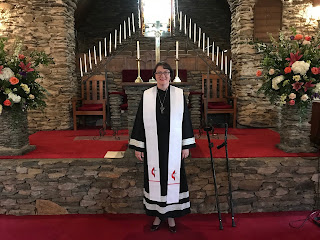Once our papers and/or videos were submitted to the Board of Ordained Ministry and we were interviewed at length and passed by each committee, we then came to the Clergy Session of Annual Conference to be asked certain historic questions that date back to John Wesley himself. The first four are these:
Have you faith in Christ?
Are you going on to perfection?
Do you expect to be made perfect in love in this life?
Are you earnestly striving after it?
First and most obviously, we declare our faith in Christ, and then the next three questions address what Wesley called "the grand depositum of Methodism, that for which we were chiefly raised up," in a letter written close to the end of his life to Robert Carr Brackenbury on September 15, 1790. This distinctively Methodist doctrine is referred to variously as Christian perfection, full/entire sanctification, holiness, and being made perfect in love, and it never fails to raise a few eyebrows or to provoke a nervous giggle or two.
You can understand why, of course. The very idea of perfection in this life seems like a pipe dream conceived of by someone with an over-inflated ego. Just look at the world around us. The level of incivility in public discourse, the acceptance of overt rudeness and lying, and the frequency of vicious ad hominem attacks in political advertisements are enough to reinforce the idea that we live in a fallen and broken world.
Or consider this. Over a dozen young people in Thousand Oaks, California died by gun violence yesterday, close on the heels of a massacre of Jewish worshipers in Pittsburgh, and the nation reels in shock and disbelief, but it happens so often in so many ordinary places that we've somehow come to accept it as "just the way things are."
That would not have made much sense to John Wesley. Wesley had a very clear understanding of the depth to which the human heart can descend. He adamantly proclaimed the reality of sin and the fierce grip it has on us all. But he also understood that God is always at work with and in us and that the justifying grace that saves us is followed by the sanctifying grace that can and will make us holy. The Holy Spirit woos and leads us as we attend to the "means of grace," the practices of prayer and worship, of receiving the sacrament and studying scripture, of caring for the physical and spiritual needs of the least, the last, and the lost among us.
Wesley knew and taught that our response to God's grace is enormously important, writing that "God does not, will not give that faith unless we seek it with all diligence in the way which he hath ordained" (Thoughts on Christian Perfection, in John Wesley, edited by Albert Outler, page 294). That says to me that we cannot give in to hopelessness or fear; we must live out the faith in Christ which we proclaim, trusting in the sovereignty of God's grace. As Wesley puts it, quoting Scripture, "ye have not because ye ask not," so why not ask?
When God reaches out and we take hold of the grace offered, we begin to become different people. We are changed, as Charles Wesley wrote, "from glory into glory,"as we begin to love God more and more AND as we love our neighbors as ourselves. It is not something we are capable of on our own -- that goes without saying -- but our cooperation with God enables us to grow in grace and in holiness, indeed, to grow towards perfection in love.
It is that goal to which we give our assent, not just on the day we stand before the Annual Conference to be ordained and set apart but every single day, and it is not a goal reserved for the clergy. Wesley firmly insisted that seeking perfection in love in this lifetime was a gift meant for every Christian to yearn for, not because we are so good (for we are not), but because God is so great.
I wonder how many of us are indeed earnestly striving after it. How many of us order our days so that we are attending to the ordinances of God, those means of grace that not only draw us closer to God but closer to others? Do we live in that same hope that Wesley had, no matter how grim the news or circumstances? If you feel despair when you look at the sickness of the world and the sinfulness within yourself, sit with these questions for a little while and listen to the whispers of the Spirit, and ask for the grace that can and will fill you with nothing but love of God and neighbor.
Have you faith in Christ?
Are you going on to perfection?
Do you expect to be made perfect in love in this life?
Are you earnestly striving after it?
Yes!




No comments:
Post a Comment